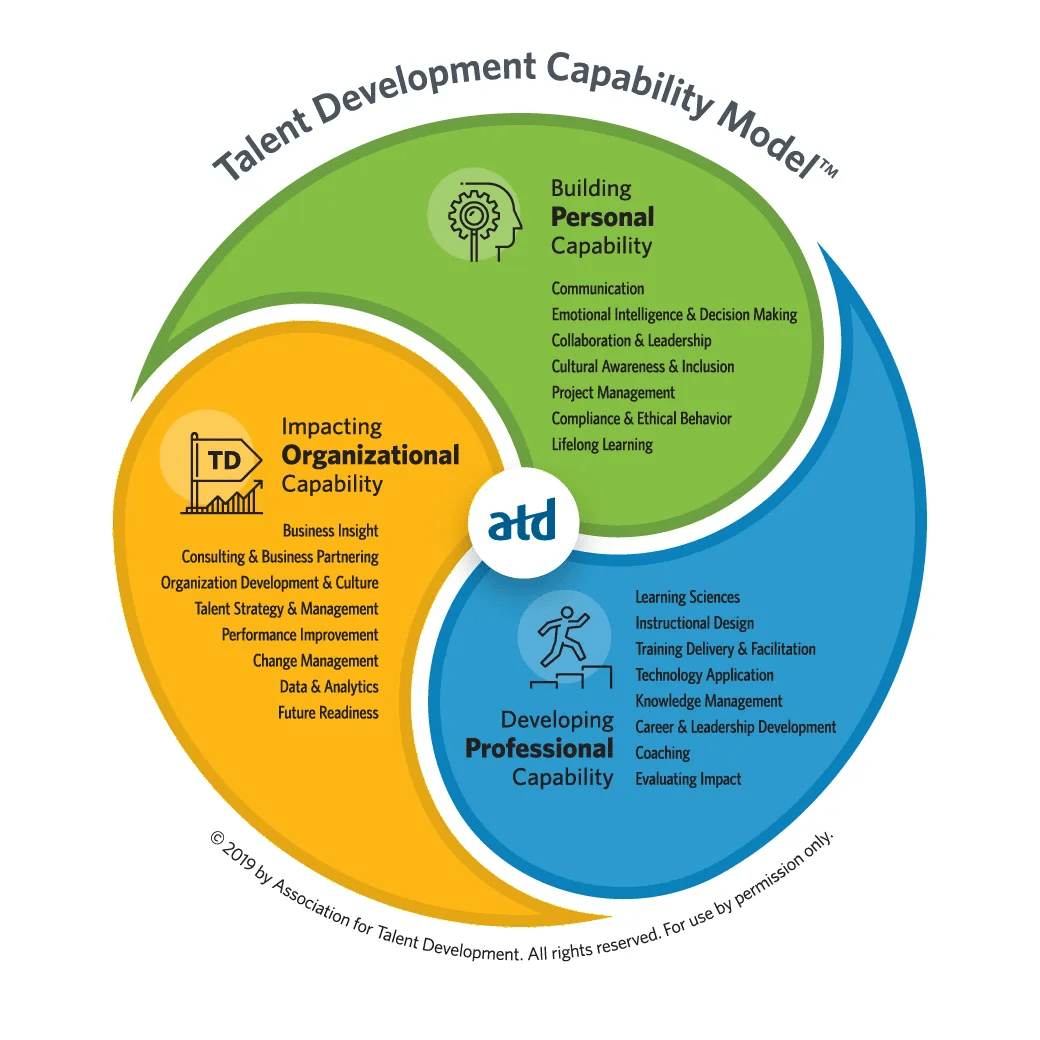What is Talent Development?
The talent development (TD) field is deep and wide, encompassing a rich history of theories and practices and a community of practitioners with varied backgrounds and expertise. According to Capabilities for Talent Development: Shaping the Future of the Profession (ATD Press, 2020), the term refers to the talent development efforts that foster learning, employee engagement, talent management, and employee development to drive organizational performance, productivity, and results. To some, talent development is an important tool for unleashing human potential. To others, it is a set of practical capabilities for driving organizational results by creating the processes, systems, and frameworks that advance training and development strategies, succession planning, and learning opportunities.
Talent development is also a profession—an occupation filled with skilled and passionate individuals that involves training and formal qualifications. To support the field, the Association for Talent Development (ATD) develops competency models specifying what a TD professional needs to know and be able to do. The ATD Certification Institute administers two credentials based on the models.
Definitions vary by country and culture, by industry, by organizational strategy, and by the responsibilities of the people practicing it. At the heart of talent development are the people—the talent. Ultimately, the function of talent development is to build employees’ knowledge, skills and attitudes so the organization can succeed and grow.
TD professionals hold education and learning in high esteem and as a group they are well-educated. Among US-based TD professionals, 87 percent had at least a four-year college degree, 44 percent had a master’s degree, and 5 percent had doctoral or professional degrees, according to a 2019 ATD research paper. The most common subject areas for a master’s degree, besides human resources and organization development, were business, business administration, and education, including instructional design, educational technology, and curriculum and instruction.Talent development is a truly global profession. Its demographic is reflected in the diverse representation of the ATD professional membership, which comes from more than 123 countries, spanning six continents.
Talent Development Capability
ATD’s 2019 Talent Development Capability study found that the knowledge, skills, and attitudes (KSAs) of effective TD professionals at all levels of their career fell into three major domains of practice that encompass the ATD Talent Development Capability Model:
Capabilities that derive from building interpersonal skill
Capabilities that come from building professional knowledge related to developing people and helping them learn
Capabilities that affect an entire organization’s ability to drive results and mission success

A comprehensive collection of the concepts, definitions, and methodologies for the profession can be found in the Talent Development Body of Knowledge (TDBoK).
Current and aspiring talent development professionals can enhance their skills with the various professional education courses offered by ATD’s education department. Practitioners who want to validate their capability may consider a talent development credential, offered by the ATD Certification Institute. Find out more about the Associate Professional in Talent Development (APTD) or the Certified Professional in Talent Development (CPTD) here.
What Does a Talent Development Professional Do?
Talent development professionals' responsibilities can vary greatly as well. The top area of responsibility within the field, according to the ATD 2019 Talent Development Salary and Benefits report, is instructional design, otherwise known as creating coursework or curriculum. Within this responsibility, you will find a TD professional conducting needs assessments, designing training programs and developing content, and evaluating impact of those training programs.
The other top areas of responsibility for TD professionals within this 2019 report were delivering training, managing the learning function, and leadership development; change management and other OD-related divisions; and talent management. TD professionals need knowledge of workforce planning, performance management, succession planning, and skills in creating and aligning talent development strategy with business strategy, analyzing skills gaps, and creating training programs that upskill for current and future talent requirements.
How Can ATD Help?
ATD is the world’s largest association dedicated to those who develop talent in organizations. Founded in 1943, ATD’s mission is to support those who help others achieve their full potential by improving their knowledge, skills, and capabilities. ATD’s members come from more than 120 countries and work in organizations of all sizes and in all industry sectors. This global community of practitioners looks to ATD’s publications, digital content, career resources, events, education courses and professional certification programs to elevate their skills and advance their careers.
ATD is the preeminent organization for talent development professionals. At our heart we are a professional development and education association. We offer various channels and ways in which you can learn about the field and transition into and further your career as a talent development professional.
Some places to start if you are new to the field are:

BLOGS
23 Key Training & Development Topic Pages
Explore 23+ L&D topics, each with in-depth blogs that dive into the latest trends and best practices in training and development. Start here!

NEWSLETTERS
ATD Newsletters
Sign up to receive newsletters from ATD topic areas catered to your interest. Learn more!

WEBINARS
Upcoming Webinars
ATD gives you the opportunity to connect live with industry leaders with the Watch & Learn webcast series. View Webinars

GLOSSARY TERMS
Talent Development Glossary Terms
Learn about essential terms and need-to-know expressions for training and development professionals. Explore now!

Education Course Catalog
As TD professionals, it’s our job to encourage, promote, and inspire people to learn and grow. And it’s critical that we do the same for you. Explore 160+ courses for practitioners like you. Start Browsing

EVENTS
ATD Events
Talent development professionals come together to give you conference experiences that are diverse in education, solutions, and opportunities. Learn more!

MEMBERSHIP
Membership
Elevate your career, expand your horizons, and make a lasting impact. Join us today and embark on a journey of growth, connection, and achievement with ATD. Your future self will thank you.

BOOKS
Publications
ATD Press is an internationally renowned source of insightful and practical information on talent development and professional development.
Free E-Book: What Is Talent Development?
Discover what talent development is, the evolution of the profession, what TD professionals do, talent development's expanding purpose, and a checklist for talent development organizational readiness.
